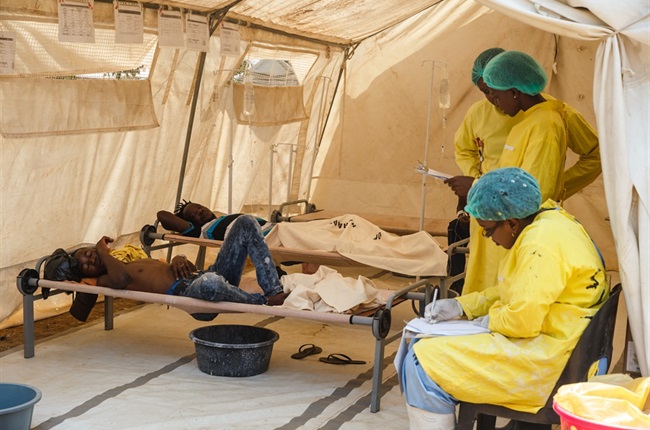“Numerous Zimbabweans Assert Government’s Failure to Address Root Causes of Repeated Cholera Outbreaks”
“In Harare, Zimbabwe, Priscilla Moyo experienced a sudden change in her husband Brian’s health upon his return from Mvurwi, located approximately 100km north of the capital. Despite seeming well initially, by Sunday night, he was stricken with diarrhea. Concerned, Moyo, aged 39, took him to a nearby clinic in Budiriro, their city suburb, on Tuesday morning, only to receive the alarming diagnosis: cholera.”
“‘He is currently receiving treatment in there,’ she said with a heavy heart, gesturing towards a grey tent serving as a makeshift treatment ward at the clinic. ‘He is on an intravenous drip, and they mention he might be discharged today.’
Across Zimbabwe’s 10 provinces, a surge of cholera cases is overwhelming health facilities in the Southern African nation. Some patients, like Brian, have managed to recover. However, others have not been as fortunate.
Jessica Muzambezi, a young mother from the same suburb, tragically lost her two-year-old son to cholera. ‘A burst sewer in my area led to the death of my son. The authorities neglected the sewer issue for two weeks,’ she recounted to Al Jazeera.
As of Tuesday, Zimbabwe has recorded 25,780 cases of cholera since the epidemic began last year. While the official government death toll stands at 470, the United Nations Children’s Fund (UNICEF), working alongside Zimbabwean authorities to coordinate resources for the anti-cholera campaign, estimates the toll to be at 528. Children remain the most vulnerable, with a third of all cases affecting youngsters aged 15 and below.
Many Zimbabweans point fingers at the government for the crisis.”
A Persistent Problem
Zimbabwe’s sewage system, a relic of its colonial past, has struggled to keep up with the population surge, ballooning from around 3.7 million in 1960 to 17 million today. Access to clean drinking water remains a challenge in many areas, exacerbated by the country’s economic struggles and outdated infrastructure.
Experts highlight that these factors have created fertile ground for cholera, a waterborne disease, to spread rapidly.
In 2008, Zimbabwe witnessed one of the continent’s deadliest cholera outbreaks, claiming the lives of up to 4,000 people. The crisis stemmed from poor sanitation, lack of clean water, and a collapsing healthcare system, exacerbated by hyperinflation reaching a staggering 79.6 billion percent on a monthly basis, rendering the local currency worthless.
The government, under then-president Robert Mugabe, shifted blame to Western powers, labeling the epidemic as a biological and chemical warfare tactic, a claim dismissed by many.
Fast forward over 15 years, and Harare finds itself grappling with yet another public health emergency, with the capital once again at the epicenter.
While cholera cases surge nationwide, Harare, the most populous province, bears the brunt, accounting for a third of all cases.
Driving through southern suburbs like Budiriro, Glen View, and Highfield reveals numerous tents donated by the World Health Organization (WHO), staffed by local healthcare workers.
To combat the crisis, Zimbabwean authorities are distributing vaccines to mitigate its impact. As of February 12, the country has received 97% of the approved 2.3 million doses from the International Coordinating Group on Vaccine Provision (ICG), with more expected later in the month. UNICEF reports that as of February 14, 1.5 million individuals (67% of the target population) have received an oral cholera vaccine dose.
In January, the health ministry launched ‘Operation Chenesa Harare’—named after the Shona word for ‘clean up’—after residents resorted to using unofficial dumping sites due to mounting rubbish. Critics argue that the garbage accumulation stemmed from inadequate resource allocation.”
“It’s Only Fiction
However, concerns persist that the current mitigation efforts may be too little, too late, and crucially, fail to address the underlying issues. Some experts and activists argue that authorities have yet to heed the lessons from previous outbreaks.
Joyleen Nyachuru, a resident of Glen View and leader of a community water alliance, is among those voices. She holds both local and central governments responsible for the latest epidemic.
“They could have taken more proactive measures to mitigate the impact of cholera on residents by addressing raw sewage leaks and collaborating to upgrade the aging sewer infrastructure,” Nyachuru told Al Jazeera.
“In Glen View, with its 12,800 houses, each accommodating four to five households, we’re looking at 15 to 20 people sharing the same facilities. The authorities must ensure clean, potable water reaches every resident to combat cholera effectively,” she stressed.
For years, many households in Harare have endured irregular water supply, with taps running just once a week in most southern suburbs. Despite government intervention, garbage remains a common sight on city streets.
Nyachuru believes these factors exacerbate the cholera crisis.
Precious Shumba, director of the nonprofit organization Harare Residents’ Trust, echoes these sentiments.
“The root issue lies in the aged and clogged underground water and sewerage pipes, leading to frequent leakages throughout the infrastructure network,” Shumba explained. He noted that sewer bursts in industrial areas often go unattended for extended periods.
Harare Mayor Jacob Mafume, while acknowledging the vaccination program’s importance, asserts that city authorities have stepped up sewer repairs and are working on enhancing the city’s water supply. He expressed optimism about imminent improvements.
“The cholera cases have significantly declined, and we are confident in our ability to turn the tide,” Mafume assured.
However, Mafume’s remarks have failed to reassure most city residents, who claim they have become accustomed to sewage flowing in their streets and have been left to fend for themselves.
“On the ground, authorities are inactive… Their promises of fixing our issues are mere fiction,” Nyachuru lamented. “They were only visible during the Chenesa Harare campaign. Since then, nothing has changed.”






